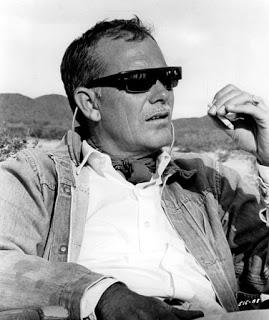
Directed By: Tom Thurman
Starring: Sam Peckinpah, Kris Kristofferson, Fern Lea Peter
Line from this film: "He left us a lasting body of orignial and haunting work and in the end, Sam Peckinpah entered his house justified"
Trivia: Won a Bronze Wrangler for Best Western Documentary at the 2005 Western Heritage Awards
“Sam had two lives”, says Peckinpah’s longtime assistant, Katy Haber, at the start of this 2004 made-for-TV documentary (which was produced for the Starz cable network): “Movies that were a reality, and life that was an illusion”. A man who poured everything he had into his craft, Sam Peckinpah was an auteur, a writer / director who put something of himself in every single film. His past, his fears, his passions and his demons were up there on the screen for the whole world to see, and as narrator Kris Kristofferson, a good friend of its subject’s, points out, this particular aspect of Peckinpah’s work, the laying bare of his very soul, is what made him a true artist.
He directed 14 films over his 25+ year career, but Legacy of a Hollywood Renegade focuses on only 8 of them, namely the westerns that were so close to Peckinpah’s heart. Having grown up on a 25-acre ranch in California, Sam Peckinpah grew to love the untamed frontier, a fondness he would explore first on television (writing and directing episodes of Gunsmoke and The Rifleman), then in feature films. The low-budget oater The Deadly Companions, released in 1961, was his fist directorial effort, but it was 1962’s Ride the High Country that made critics and audiences alike sit up and take notice. Based on the success of this incredibly moving film, the studio gave him a chance to direct Major Dundee, a large-scale picture starring Charlton Heston and Richard Harris that was a bust at the box office. Still, his experience on Dundee prepared him for his next project, The Wild Bunch, a beautiful, violent motion picture about the dying west that some called trash (the blood flows freely in The Wild Bunch, more freely than most were accustomed to seeing at that time) and others declared a masterpiece (critic Roger Ebert was one the film’s staunchest defenders in its early days).
Peckinpah followed this up with 1970’s The Ballad of Cable Hogue (which he often said was his favorite of all his films) and Junior Bonner, a 1972 family drama set against the backdrop of a professional rodeo. Neither Cable Hogue nor Junior Bonner made much money, a fact that wasn’t lost on their director, who for years had to answer questions about why the violence in his movies was so visceral (“I made a movie where nobody got shot”, Peckinpah said of Junior Bonner, “and nobody went to see it”). Pat Garrett and Billy the Kid marked another high-point in his career, and has what I consider the finest sequence ever committed to film (for more on that, check out my review of the movie), while his final “western”, Bring Me the Head of Alfredo Garcia, defied genre, and was roundly panned by most critics upon its release (Peckinpah biographer David Weddle called the film “A genuine work of art and a demented movie”). In these 8 films, Sam Peckinpah presented a vision of the west that was simultaneously romantic and brutal, lamenting the loss of a simpler time while showing us that the line separating its heroes from its villains wasn’t as clear-cut as the Westerns of Hollywood’s heyday led us to believe.
Featuring interviews with those who knew him intimately (his sister Fern Lea, son Matthew, and frequent collaborators L.Q Jones and James Coburn), and those who drew inspiration from his films (actors Billy Bob Thornton and Michael Madsen, writer/director Paul Schrader), Legacy of a Hollywood Renegade delves into the professional and personal lives of its subject. We learn how Peckinpah’s mother influenced him early in life, only to alienate him later on when she abruptly sold the family ranch (his grandfather wanted Sam and his older brother Denny to inherit it); and hear first-hand how alcohol and drugs eventually got the best of him, cutting short both his career and his life (Peckinpah died in 1984 at age of 59). And, of course, we’re treated to clips from his movies, which only seem to get better with age. For more than 3 decades, Sam Peckinpah’s star shined brightly, but burned out far too quickly.
When you think of those directors who defined the western genre, names like John Ford (Stagecoach, The Searchers), Anthony Mann (Winchester ’73, The Naked Spur), Budd Boetticher (Seven Men From Now, The Tall T), and Sergio Leone (The Good The Bad and The Ugly, Once Upon a Time in the West) leap immediately to mind. So, too, does the name Sam Peckinpah, whose love of the frontier was evident in every frame of the movies listed above, but who, in the end, proved his own worst enemy. Filmmaker and scoundrel, Sam Peckinpah was a child of the American west, and we will never see the likes of him again.
